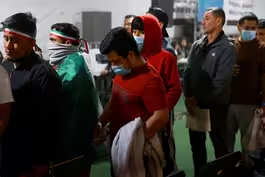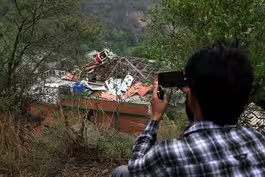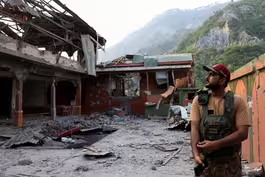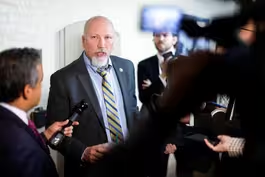
A look at difficult issues the next pope will face
Clip: 5/7/2025 | 8m 11sVideo has Closed Captions
As the conclave begins, a look at difficult issues the next pope will face
Black smoke poured from the chimney of the Sistine Chapel on Wednesday, signifying that the cardinals did not elect a new pope on the first ballot. The cardinals are considering difficult and divisive issues as they choose the next pontiff. Geoff Bennett discussed the conclave and the controversies surrounding the Catholic Church with Philip Shenon, author of "Jesus Wept."
Problems playing video? | Closed Captioning Feedback
Problems playing video? | Closed Captioning Feedback
Major corporate funding for the PBS News Hour is provided by BDO, BNSF, Consumer Cellular, American Cruise Lines, and Raymond James. Funding for the PBS NewsHour Weekend is provided by...

A look at difficult issues the next pope will face
Clip: 5/7/2025 | 8m 11sVideo has Closed Captions
Black smoke poured from the chimney of the Sistine Chapel on Wednesday, signifying that the cardinals did not elect a new pope on the first ballot. The cardinals are considering difficult and divisive issues as they choose the next pontiff. Geoff Bennett discussed the conclave and the controversies surrounding the Catholic Church with Philip Shenon, author of "Jesus Wept."
Problems playing video? | Closed Captioning Feedback
How to Watch PBS News Hour
PBS News Hour is available to stream on pbs.org and the free PBS App, available on iPhone, Apple TV, Android TV, Android smartphones, Amazon Fire TV, Amazon Fire Tablet, Roku, Samsung Smart TV, and Vizio.
Providing Support for PBS.org
Learn Moreabout PBS online sponsorshipGEOFF BENNETT: Black smoke poured today from the chimney of the Sistine Chapel, as 133 cardinals from across the globe began in earnest the process of selecting the next pontiff.
As expected, the smoke signifies the cardinals could not reach a two-thirds consensus on the first ballot.
Before the vote, church leaders gathered for a final mass.
Then, with a ceremonial Latin declaration, the chapel was cleared, the doors were closed, and the group began one of the most secretive elections in the world.
The cardinals will be considering a number of difficult and sometimes divisive issues.
Survivors have also called on the cardinals to consider the history of sexual abuse and the church's conduct in the past,when crimes have been covered up and priests have too often been protected.
Peter Isely, a founding member of SNAP, the Survivors Network of those Abused by Priests, is in Rome.
He spoke to us as the conclave began about demanding accountability and a new path forward that his group calls zero tolerance.
PETER ISELY, Survivors Network of those Abused by Priests: Zero tolerance means two things.
One, any priest or cleric where it has been determined that he has sexually assaulted or abused a child is permanently removed from the priesthood.
Secondly, zero tolerance means accountability.
It means that any church official, cardinal, or bishop that has been again determined after investigation that he has covered up sexual abuse crimes of children, that he has obstructed justice in the countries where these crimes are occurring, that he can no longer function as an authority or an official in the Catholic Church.
GEOFF BENNETT: Isely also said he's concerned the next pope may also have a history of too easily ignoring past abuse or not being transparent enough, but he hopes the successor to Francis may feel pressure to meaningfully change the Vatican's approach.
PETER ISELY: You got to be optimistic.
You have to be hopeful, but I'm hopeful about how much awareness has happened in the last 30, 40 years.
What I think about as a survivor are the thousands of survivors I know and I have worked with, my brothers and sisters.
We have all undergone this trauma, and we all want this never to happen to another child.
This is the first time really in history in which the issue of abuse and cover-up and these crimes is being taken very seriously, it seems.
The Vatican is talking about it.
They're saying this is going to be the number one or one of the top priorities for the next pope, and that's historic.
GEOFF BENNETT: For more now on the conclave and the controversies facing the Catholic Church, we're joined by Philip Shenon.
He's an investigative reporter and the author of "Jesus Wept: Seven Popes and the Battle for the Soul of the Catholic Church."
Thanks for being here.
PHILIP SHENON, Author, "Jesus Wept: Seven Popes and the Battle for the Soul of the Catholic Church": Thank you.
GEOFF BENNETT: Your book is an investigation of the Catholic Church post-World War II, and sex abuse is this ever-present theme.
Why has this been such an enduring problem for the Catholic Church?
PHILIP SHENON: Well, it's actually an enduring problem that dates back to the Dark Ages.
This apparently has been a problem within the Catholic Church for centuries and centuries.
And we know that, in recent decades, that it has been a story of cover-up, cover-up by popes, cover-up by cardinals in the Vatican.
And it's been a very long reckoning for the church to come to terms with it, and I would argue it still has not come to terms with it today.
GEOFF BENNETT: And why is this notion of zero tolerance a point of contention?
On its face, it seems like a very clear and morally just principle.
PHILIP SHENON: It's a crime, child abuse.
What the priesthood is, what the Catholic Church is, is a hierarchy that is in many ways a brotherhood in which these men watch out for one another, as they would for a brother or a father or grandfather.
You protect those in the family.
And, in fact, unhappily, that cover-up, that wilderness to protect has meant that a lot of crime has gone unpunished in the church.
GEOFF BENNETT: So give us an example of one of the egregious cover-ups you recounted in your book.
PHILIP SHENON: I think the single most shocking document I uncovered in all my years of research was a letter written in 1999 by Cardinal John O'Connor of New York, arguably the most powerful churchman in America at the time, who had just learned he was probably about to die.
He'd just undergone brain surgery.
And in one of his final acts on Earth, he sends a letter to Pope John Paul II to warn him that he must not promote Cardinal or then Bishop Theodore McCarrick of New Jersey to any higher post in the church, because he was well-known to be a sexual predator.
And the story is that lots of other people told this to John Paul II.
John Paul II still wanted to believe McCarrick was an innocent man, made him a cardinal in Washington, D.C., and McCarrick became one of the most prominent spokesmen for the church in America for decades to follow.
GEOFF BENNETT: The cardinals will assemble again tomorrow for a second round of voting.
Give us a sense of the competing factions within the church and the differing visions of the future.
PHILIP SHENON: Well, I think the question will be whether or not the legacy of Pope Francis will live on beyond his papacy.
His message to the world was one very much framed by the Gospel as one of mercy and tolerance, putting -- punishing sin behind promoting mercy as the cause of the church.
And there are many people who think he was too liberal, too progressive,he ignored too much of the tradition of the church.
And I think the central debate now among the cardinals will be, do we want somebody who continues that mission, continues that agenda, or somebody who reverts back to a much more traditional church?
GEOFF BENNETT: What other issues might the next pope face?
PHILIP SHENON: Well,Pope Francis, I think, will probably best be remembered for his outreach to gay Catholics.
He uttered those famous words "Who am I to judge?"
in reference to gay people.
And that really rewrote 2000 years of tradition.
Previously, homosexuality had been branded a grave sin.
And he had a dialogue with divorced Catholics in a way that had not been true in centuries.
They were given an easier way to remarry within the church and allowed to receive holy communion for the first time in centuries.
And there are people within the hierarchy who believe that that was the wrong move, that that dishonored tradition, and that Pope Francis' agenda on those issues must be reversed.
GEOFF BENNETT: And there are some who are predicting a pivot toward a more conservative papal leadership.
Do you see that happening?
PHILIP SHENON: Well, there's a lot of talk about that among conservative Christians.
A lot of American commentators seem to believe that there will be a pope to follow Francis who will reverse his agenda.
I find that hard to believe, if only because 80 percent of the cardinals who will choose Francis' successor were put in the college of conclaves by Francis.
And it seems to me hard to believe that these men, given this great honor by Francis, would want to dishonor his legacy by finding a pope who reversed much of his policies.
GEOFF BENNETT: Are there any lessons from previous conclaves that inform the current moment?
PHILIP SHENON: Well, I think, as is true for most conclaves, we really don't know how this is going to end.
I think this conclave in particular is unpredictable.
We have a variety of cardinals who've never met one another.
They come from the far ends of the Earth.
Francis increased the countries represented in the conclave by something from 40 to 80, to nearly 80.
And, again, these men don't know each other so well.
Many of them are not particularly well-known within the church.
And I think it's going to be at least a few days of deliberations among the cardinals about who they're comfortable with leading their church.
GEOFF BENNETT: Where are you watching for?
PHILIP SHENON: I would watch for the name that the new pope chooses when he emerges on the balcony at St. Peter's.
That's obviously a first message to the world about what his agenda will be.
If the new pope is Pope Francis II, I think that tells you that Francis' legacy lived on.
If he chooses the name of one of his more very conservative papal predecessors, you can look for a change in the church.
GEOFF BENNETT: Philip Shenon, thanks so much for your insights.
We appreciate it.
PHILIP SHENON: Thank you.
Examining Trump's latest hardline immigration policies
Video has Closed Captions
Clip: 5/7/2025 | 6m 22s | Examining Trump's latest hardline immigration policies and legal battles around them (6m 22s)
Pakistan calls Indian strikes an act of war, vows to respond
Video has Closed Captions
Clip: 5/7/2025 | 3m 8s | Pakistan calls Indian strikes an 'act of war' and vows to respond (3m 8s)
Pakistani ambassador, Indian advisor share views on attacks
Video has Closed Captions
Clip: 5/7/2025 | 10m 54s | Pakistani ambassador, Indian advisor share perspectives on recent attacks and retaliation (10m 54s)
Rep. Chip Roy: GOP leaders need to 'show us the math'
Video has Closed Captions
Clip: 5/7/2025 | 6m 26s | Rep. Chip Roy says GOP leaders need to 'show us the math' in tax cut, Medicaid talks (6m 26s)
Social network brings people together in divisive times
Video has Closed Captions
Clip: 5/7/2025 | 9m 56s | How a social network is bringing people together in increasingly divisive times (9m 56s)
Providing Support for PBS.org
Learn Moreabout PBS online sponsorship
- News and Public Affairs

FRONTLINE is investigative journalism that questions, explains and changes our world.

- News and Public Affairs

Amanpour and Company features conversations with leaders and decision makers.












Support for PBS provided by:
Major corporate funding for the PBS News Hour is provided by BDO, BNSF, Consumer Cellular, American Cruise Lines, and Raymond James. Funding for the PBS NewsHour Weekend is provided by...




